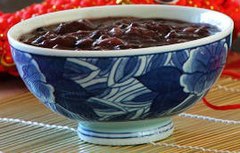Laba Festival
| Laba Festival | |
|---|---|
 A bowl of Laba congee. | |
| Official name | Làbā Jié (臘八節, 腊八节) |
| Observed by | Chinese |
| Significance | Celebrates the enlightenment of the Buddha |
| Observances | Consumption of the Laba Congee, etc. |
| Date | 8th day of the 12th lunar month (Gregorian calendar dates shown below are incorrect. Please verify with another source until the method used here to compute these dates is corrected.) |
| 2021 date | 20 January |
| 2022 date | 30 December |
| 2023 date | 8 January |
| Related to | Bodhi Day Rohatsu (in Japan) Other related festivals Vesak (in Sri Lanka, Myanmar, Thailand, Cambodia, Laos) |
| Laba Festival | |||
|---|---|---|---|
| Traditional Chinese | 臘八 | ||
| Simplified Chinese | 腊八 | ||
| Literal meaning | "Eighth of La" | ||
| |||
This article needs additional citations for verification. (January 2009) |
Laba Festival (Chinese: 臘八節) is a traditional Chinese holiday celebrated on the eighth day of the La Month (or Layue 臘月), the twelfth month of the Chinese calendar. It is customary on this day to eat Laba Congee. The Laba Festival had not been on a fixed day until the Southern and Northern dynasties, when it was influenced by Buddhism and got a fixed time on the eighth day of twelfth month, which was also the of the Buddha. Therefore, many customs of the Laba Festival are related to Buddhism. It corresponds directly to the Japanese Rohatsu and the South Asian Bodhi Day.
History[]
Before the Qin dynasty the Laba festival was a celebration of the new harvest.
After Buddhism spread to China during the first century CE, the festival was used as commemoration of Gautama Buddha's enlightenment at the age of 35. During the Qing dynasty, ceremonies for the Laba festival would have been held in the Yonghe Temple in Beijing.[citation needed]
Customs[]
Traditionally, the consumption of Laba congee was an important element of the festival. In Northeast China, Northwest China and Jiangnan, this custom has been preserved, but it has become rarer in South China[citation needed]. On the first day of spring the government would hold a ceremony called “Beating ” with the purpose of encouraging farming. Officials would use a colorful club to beat an earthen ox after worshiping the God of Grain; this was the so-called “Scourging Spring”. Even today, people in some places name Spring Begins as Beating Spring. After the ritual of “Beating Spring”, people would compete in grabbing the scattered pieces of the earthen ox, which would dispel pests or ants, and bring them good harvest in farming and abundant production of silk and livestock.
Another custom is the soaking of Laba garlic. Garlic is soaked in vinegar for twenty days starting from the Laba festival. The garlic and vinegar are then used alongside Chinese dumplings (or jiaozi) around Chinese New Year[citation needed].
Laba congee[]
Congee for the imperial court would have been made of cream, lamb, various mixed grains, dried red dates, longan, chestnuts, peanuts, water caltrop, walnuts, raisins, melon seeds, and haw jelly.
Other congees are made of mixed rice, beans, and various types of nuts and dates. Sometimes the congee is decorated with coloured sweets or dried fruits.[citation needed]
Laba porridge[]
Laba porridge (臘八粥 Làbāzhōu) is very popular in many places in China. Different kinds of rice, beans, nuts and dried fruits are the main ingredients. People believe that it’s good for health in cold weather.
Laba garlic[]

Another Laba food is Laba garlic, which is particularly popular in northern China.[1] Garlic in Chinese, suàn, shares the same pronunciation with 'calculate'[citation needed]
In popular culture[]
The festival is relevant to the plot of Jin Yong's novel Ode to Gallantry.
In 2011 Google published a Google Doodle commemorating the festival.[2]
References[]
https://web.archive.org/web/20100108101652/http://cn.netor.com/know/tcustom/tcust13.htm (Chinese) https://web.archive.org/web/20081214201201/http://www.arakakikamada.com/fuushuu1.html (Japanese)
- ^ Block, E. (2010). Garlic and Other Alliums: The Lore and the Science. Royal Society of Chemistry. ISBN 978-0-85404-190-9.
- ^ "Laba Rice Porridge Festival 2011". Retrieved 11 January 2015.
- Public holidays in China
- Buddhist holidays
- December observances
- January observances
- Observances set by the Chinese calendar
- Buddhist festivals in China
